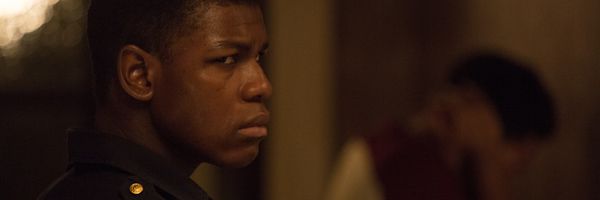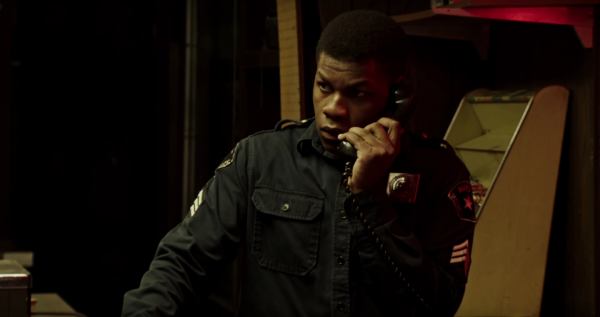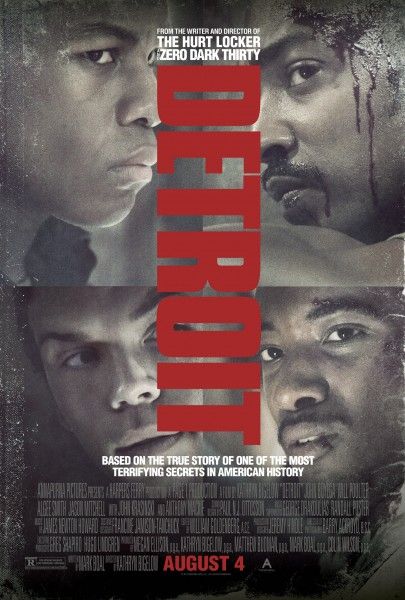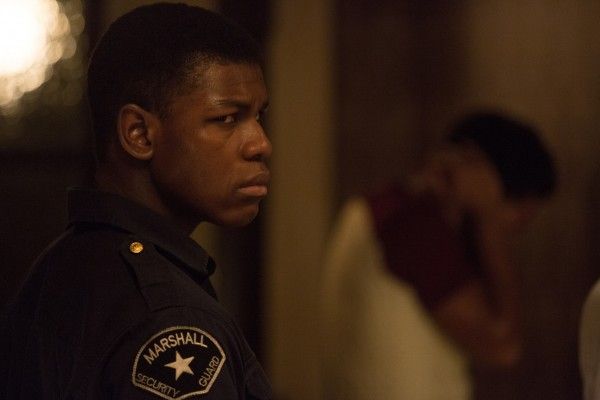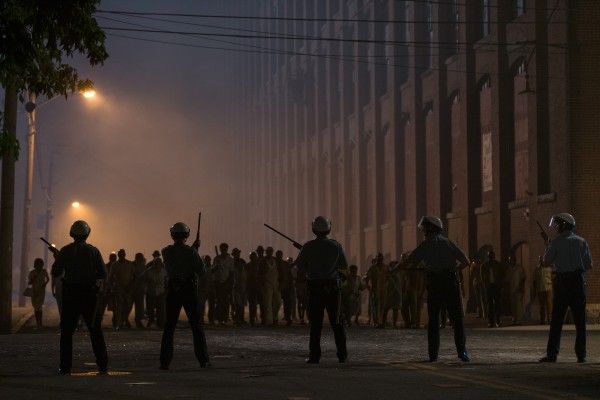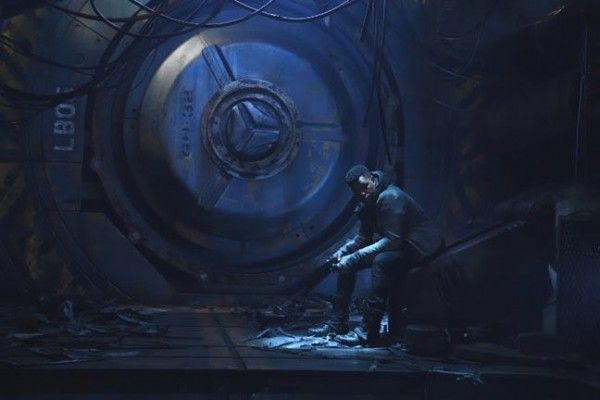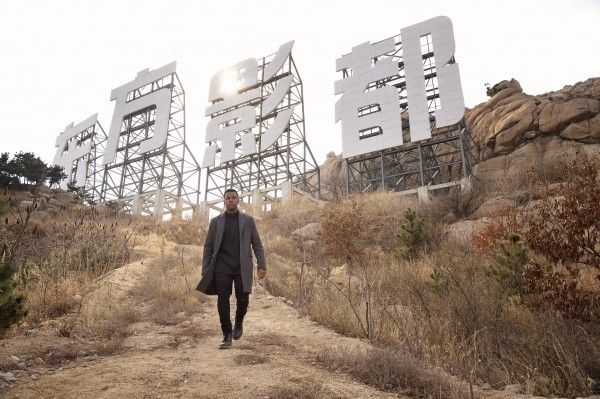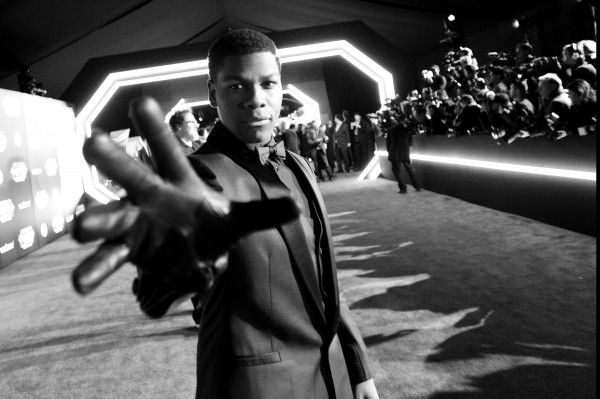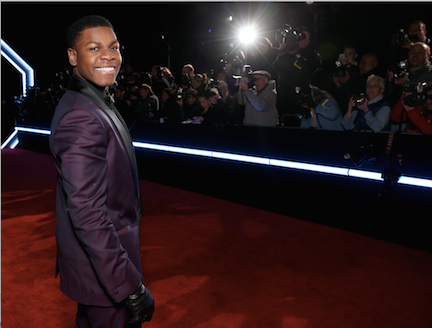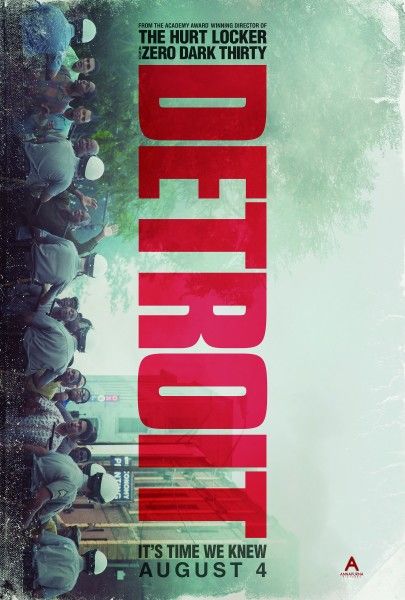With Kathryn Bigelow’s Detroit now in theaters, I recently landed an exclusive interview with one of its stars: John Boyega. He talked about what it was like on set making such an intense film, how he likes to prepare for a role, what he was nervous to shoot prior to filming, his preference for the amount of takes he likes to do, how additional photography is part of the filmmaking process but that they didn’t do any on Detroit, and a lot more. In addition, with Boyega being one of the producers on Pacific Rim: Uprising, he talked about how he landed that role, what it was like working for Rian Johnson on Star Wars: The Last Jedi, if he’s going to work with Joe Cornish (Attack the Block) again, and what kinds of projects he wants to do in the future.
If you haven’t seen any of the Detroit trailers or read Matt Goldberg’s glowing review, the crime thriller is set against the backdrop of the Detroit riots of 1967, which were initiated by a police raid of an unlicensed bar in the city’s Near West Side. The confrontations turned violent, resulting in the deaths of 39 people and leaving hundreds wounded as the riots lasted for five days. Bigelow’s film, which was scripted by Mark Boal (The Hurt Locker), zeroes in on one specific event that took place during the riots—a raid of a motel that blurred the lines between good cops and bad cops. The ensemble cast also includes Chris Chalk, Nathan Davis Jr., Kaitlyn Dever, Austin Hébert, Joseph David-Jones, Malcolm David Kelley, John Krasinski, Jacob Latimore, Anthony Mackie, Jason Mitchell, Hannah Murray, Ben O’Toole, Will Poulter, Jack Reynor, Algee Smith, Peyton Alex Smith, Jeremy Strong, Ephraim Sykes, and Leon Thomas III.
Collider: What's more nerve wracking: trying not to reveal Star Wars spoilers or doing a play at the Old Vic?
BOYEGA: Doing a play at the Old Vic for sure.
I was going to say that must have been like one of the career highlights for doing something there.
BOYEGA: Yeah, doing a play at the Old Vic for me was one of the best things that ever happened to me and I needed it. I needed to go back on stage, I needed to refresh and get to know myself on ... and get involved with my craft on a very raw level and the best way to do that was is when the audience is right in front of you. When there is no room for mistake. When people have paid a large sum to come and watch you live and I enjoyed doing that.
Let's jump into Detroit. It's such an intense film. Can you talk about how the shoot went and how Kathryn [Bigelow] ran the set?
BOYEGA: She was great. It was smooth. But it was definitely a challenge, even grueling at times, given the subject matter. Kathryn sets ... well there was a mild intensity to it, given what it's about race and we had actors on set that had to go to places emotionally that were quite uncomfortable. So there was a need for a form of intensity on set. But it ended up working out, you know? And we had a good fun, good laughs as well. Especially when you had Mr. Anthony Mackie on set sometimes, there's always space for a laugh when he's around. Yeah, we had a brilliant time.
I heard this story, and I don't know if it's true, that she supposedly withheld portions of the script so some actors would be surprised as they were filming to find out what exactly was going on. Did that happen to you in any of the scenes?
BOYEGA: Not true, I think that was mostly for Algee. That was mostly for Algee Smith, but everyone else was pre-clued up but him. So I don't know what specifically she wanted from him but that was the best process I guess.
The film had so many scenes that looked tough to shoot. What was the one that maybe you were most nervous to get right, prior to the shoot?
BOYEGA: It would definitely be the interrogation scene. The scene in which Melvin discovers that he is now a suspect. And I didn't know that that was ... we didn't know I was going to shoot that, that day. That scene was actually scheduled in to be shot much later in the schedule. And I ended up having to shoot it in the first week of filming. And I hadn't shot the scenes that kind of warm me up to that moment. And that was a big moment for me in the whole film and that was challenging.
How do you typically like to prepare for a role and how did it differ getting ready for Detroit?
BOYEGA: With Detroit, it starts with research about the circumstance. About the time, the history. We all had to do that and we all had to research because a lot of us didn't know about the particulars during the military operation that happened, at the Algiers [Motel]. I didn't know about it, so I had to do that research. And then the second factor is obviously Melvin Dismukes is still alive so I to meet him and speak to him and get to know him as a man. And then as a person and obviously get to know him as it relates to the specific situation. And we did, we had a great time talking.
I can't even imagine what that meeting was like.
BOYEGA: It was amazing and he was very transparent in how he felt and I was given a blueprint and I was given clarity on certain decisions. And just to get to know who I'm portraying and what kind of character I'm learning how to build. I kind of see a Lego sometimes, you just have to build a character around an emotional truth and he was there to facilitate that.
A lot of actors like the Clint Eastwood method of filming a rehearsal, doing a take or two, moving on. And some love the method of David Fincher like forty, fifty takes. How do you typically like to work and how did Kathryn like to do it on Detroit?
BOYEGA: To be honest with you, as long as I understand my director's goal and vision, I will work however they want me to work. I don't have ... I obviously love the fact that on base you were given more time within scenes to just be free and natural. That's something that could co-exist with any process, whether you want to be quick or whether you want to kind of take your time. But I really feel like each film has its own message and each film is open as far as its own creative process. And I'm just one of those actors, I just believe in collaboration. And if I am passionate enough about it and I am passionate and I can see the vision of the director, then I can shape shift into whatever suits the project, who's doing it.
You know what's interesting I've watched Woody Harrelson work and on every take he does something different, either for himself or to give the editor more choices. Do you notice with the way you're performing, when you're on set, do you like to mix it up on every take?
BOYEGA: I try to mix it up on every take. But it also depends, it's not black and white. Sometimes there's a specific kind of ... there's and emotional, there's an emotion that you want to show in a certain type of way. And sometimes you don't get it in the first take, and so you have to do that version again. But you just have to try and explore different ways of doing that so you get to your intended goal. I do think sometimes you have to explore within the same kind of emotional range, but then sometimes you're like “okay, let me try this differently.” It's whatever helps facilitate the take, the scene.
Sure.
BOYEGA: But sometimes I feel like I really love to mix it up sometimes because I don't want to come back and re shoot.
Sure, that leads me to my next question. Every movie nowadays does additional photography. Did you do any on Detroit?
BOYEGA: No.
Wow.
BOYEGA: There was no re-shoots on Detroit for me. For anyone, I don't think there was. Which is a first. Every single project I've done, so far, had re-shoots. And that's including all the Star Wars movies and Pacific Rim we had re-shoots also.
It's interesting, on a lot of the movies nowadays, and they do it on all the Marvel movies, they work into the schedule additional photography because when you're in the editing room you notice you've missed something.
BOYEGA: Yeah and that's perfectly normal. It's no easy task especially with visual effects, digital effects and then story also. You have big movies having to talk about finding the balance between visual, spectacle and then at the same time great story and great characters. And that balance requires additional time just to get it right.
Sure. I'm a big fan of Joe Cornish and obviously loved Attack the Block. I know he's finally filming another movie later this year. Has he asked you to make a cameo or be in it?
BOYEGA: I don't do cameos for now. But we were definitely talking to collaborate on something else, we're just trying to find out what that will be. It's not easy to come up with an original idea. Just trying to find the right project so we can come back again. But we're definitely going to work together.
Yeah, I'm so happy he's finally getting behind the camera again. It's been far too long.
BOYEGA: Yeah, it has. Yeah, it has and I'm excited.
You are a producer on Pacific Rim Uprising, if I'm not mistaken. Is that true?
BOYEGA: Yes, yes.
So I have to ask you, what did you have to do to keep the actor named John Boyega in line?
BOYEGA: [laughing] Yeah, you know, you just make sure, make sure he's ready for the task of beating down some Kaiju, man. It was fun, it was fun doing both roles. I was able to have a separation from being on screen and I was given the freedom to be what producers are, which are be silent but complex guardian angels for a project. And that's something that I really, really enjoyed doing. And through my company as well, Upperroom Entertainment, and that's something I've always dreamed of is to collaborate on the best films through my own temple and I enjoyed it really.
I was going to say, it's actually incredible that you were able to ... that you're making that transition already to being a producer and being involved behind the scenes. Can you sort of talk about maybe what surprised you as being a producer on the film that maybe you weren't expecting or just talk a little bit about that.
BOYEGA: For me, it's the conversations that you have that just reflect how much the bigger picture affects the projects that you're making. What I mean by the bigger picture is, you know, how well the movie's going to do, what date it's released, all these various different things that can sometimes affect the creative process.
I just feel like sometimes your job as a producer is to find, you know, the balance. Do you understand what your actors need? Are you also understand what your studio needs? And you're trying to find a balance between the two to make sure this rhythm of collaboration is consistent. Not only while filming is going on but also with marketing and all these various other things.
And you're having to just think about the scene as just a scene and now it becomes about several other things that you have to take into consideration. And that, for me, was just like “okay!” You know, just all of those times when as an actor I'd be in a particular scene and things would change and I wouldn't understand. This is why. I need to kind of let the bigger conversations that happen behind the scenes loose. It's cool being exposed to that.
I would imagine it's amazing. Was this something that when you got involved with the project, was that something you went after also, like I want to be a producer if I'm going to get involved in this project?
BOYEGA: No, I mean I was actually in town and I knew nothing about Pacific Rim. I actually had a meeting with Legendary, through my company, I went there as an actor. So I was just, I was in town anyway meeting with several different studios just to introduce everybody to a company I just launched and to give people my vision and what we are expected to do and the people that I'm working with.
And then, when I went to Legendary then Mary Parent came and Cale Boyter, I've had a great relationship with them and they now told me about Pacific Rim and what they wanted, what they wanted to do. And then Mary made the suggestion saying that, yeah your company should get involved, I really like their vision. I really like what you guys are trying to do, and I think this is the right first project for your company. I thought my company would handle a project with a much smaller budget, but [laughing]. It's fun to be, go on to these opportunities.
BOYEGA: Yeah.
What do you think that he brings to the Star Wars universe that maybe hasn't been seen before?
BOYEGA: I just think that Rian has really cool, original ideas, especially within the realms of sci-fi. We've seen that in Looper and I feel like he's, he's mining the operation in a greater way in which that he can obviously impart the Star Wars that we know. He can give us the same tones that make us know it's a Star Wars movie. But at the same time he has new ideas that just, it moves the story forward and then it expands the universe.
Because, we're coming to a point where… we never want to say that we're too used to Star Wars. Especially when we've got all these spin offs coming out, as well as the main film. So it's always important to expand the universe, have new ideas and that's something that he's definitely doing.
How much to they tell you in advance of filming about the full story? And how much is it, you show up on set and they finally give you a script?
BOYEGA: No, you would have read the full script before you come on set. The thing is, you know the story but you can't take the script home, so ... you're having to remember certain things. You're reading a lot more. The script is never too far away on a Star Wars set because it's just the details that takes a lot of reading, reading all the time. So it can get harder, sometimes, when it comes to that.
If you don't mind, I wanted to ask you about, I asked you earlier about the way people like to work and the amount of takes? I'm curious if you could talk a little bit about comparing Rian and the way he likes to work on set, to maybe the way J.J. [Abrams] worked on set.
BOYEGA: I don't know, I don't know. I find it hard comparing directors just because they're supposed to be different. Because, they're two different people. But I just, yeah, I found them to be, I found them to be quite ... I don't know. They're different. They're very different. I can't really compare the two. And that was two separate, two separate experiences as well.
I'll switch on to something else. I would imagine you're being offered a lot of different projects right now. And I'm curious, do you feel more pressure now to pick your next project? Or is it more just about what's the best script that I can get my hands on?
BOYEGA: Well, it's the script, it's who's directing, that's my number one right now is directors. After experiencing what I experienced with Kathryn, I now have a really deep interest to collaborate with the very best, if they so, if they so want to. So it's about finding whichever project would best be to collaborate on and that's something that I've definitely opened my mind up to.
Cool. Thank you so much for your time and congrats on Detroit, it's a fantastic film.
BOYEGA: Yeah, thank you so much.

